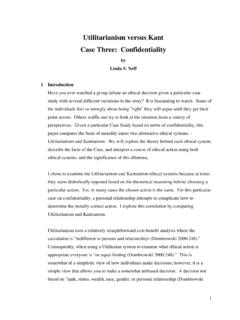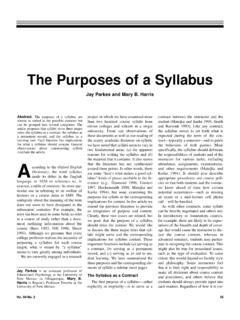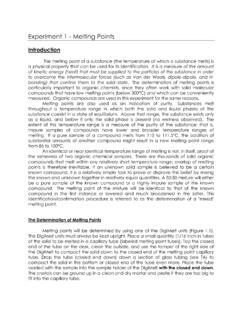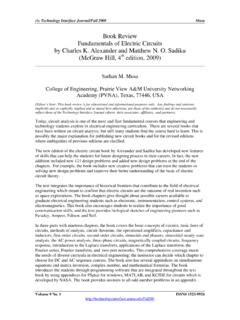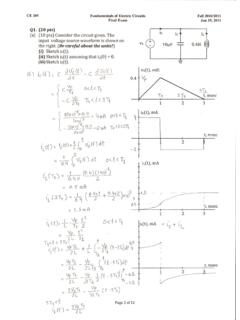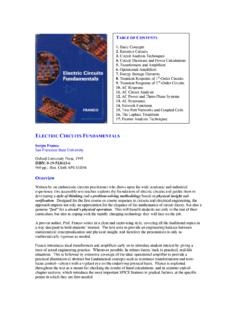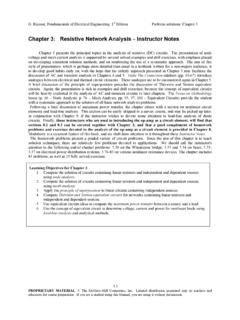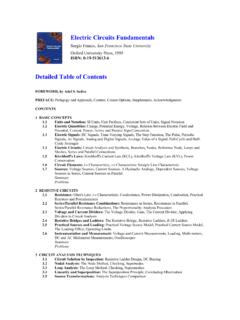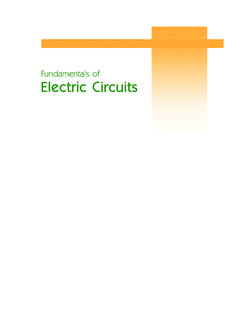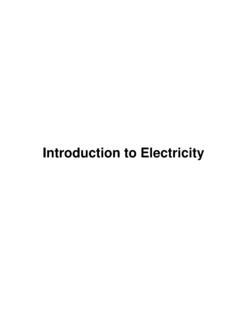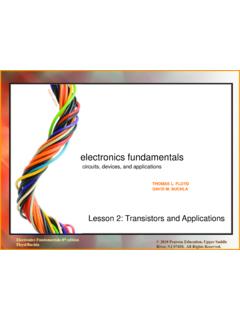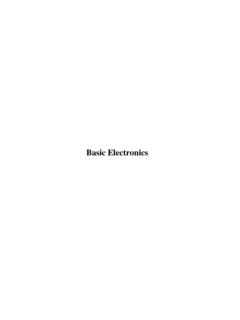Transcription of Fundamentals of Electric Circuits,
1 EE 188 Electrical Engineering I Page 1 of 3 Version 8/26/01 Northern Arizona University College of Engineering and Technology Fall 2001 Section 01 Sequence 40296 TuTh 9:35 AM 10:50 AM Rm 332, Bldg 69 Jerry Hatfield, Associate Professor Office Hours: TuTh 11:10 12:25 Phone: 523-4648 WF 1:50 2:40 E-mail: other times by appointment Office: 324 CATALOG DESCRIPTION: Introduction to electrical engineering including circuit analysis, operational amplifiers, transducers, transformers, and laboratory measurement techniques. 3 hrs. lecture CO-REQUISITE COURSE: MAT 136 (must have completed with C or better or be currently enrolled) PREREQUISITE SKILLS: Strong in algebra and trigonometry Able to solve simultaneous equations Familiar with complex number arithmetic TEXT: Fundamentals of Electric Circuits, by Alexander and Sadiku, McGraw Hill, ISBN 0-07-248287-7 or 0-07-249444-1 (includes CD and solved problem examples) OTHER MATERIALS: A calculator that can efficiently do complex number math will be needed when working with AC circuits.
2 A calculator that meets these requirements will be available on loan later in the course if your calculator does not have the required capabilities. ABET: This course contributes 3 credits of engineering science to the ABET Professional Requirements. TEACHING PHILOSOPHY: Material is presented within a context of electrical systems and circuits with useful applications. Models of electrical devices and systems such as transistors, operational amplifiers, comparators, general amplifiers, transducers, motors, and generators are used to teach and practice basic circuit analysis methods. Some design activity is introduced in the form of selecting component values to achieve circuit performance within specified performance limits. Mechanical analogies are used to assist the understanding of voltage, current, power, resistance, inductance, and capacitance. Cooperative learning is encouraged by the use of team quizzes. COURSE OBJECTIVES: Upon successful completion of this course, each student will have the capability to: Perform basic steady-state DC and AC analysis for electrical circuits consisting of resistors, inductors, capacitors, independent voltage and current sources, ideal transformers, and operational amplifiers.
3 Develop Thevenin and Norton equivalent circuits and use them to model the behavior of real power sources, signal sources, and general amplifiers. Perform power calculations for electrical circuits and for single and three-phase power systems with complex loads. TOPICS: Definitions, laws and theorems of electrical systems and circuits Analysis of direct current (DC) and alternating current (AC steady state) circuits Understanding of electrical components like resistors, capacitors and inductors Use of transducers, op amps and transformers in electrical systems Single and three-phase power TENTATIVE SCHEDULE: 09/21/01 last drop day 09/25/01 Exam #1 10/25/01 Exam #2 10/26/01 last W day 11/29/01 Exam #3 12/13/01 Final Exam, 10:00 AM 12:00 noon EE 188 Electrical Engineering I Page 2 of 3 Version 8/26/01 STUDENT RESPONSIBILITY - Students are responsible for their learning and should actively participate in class discussions, ask questions, ask for assistance or clarification, challenge information that does not seem reasonable, provide feedback to the instructor on how to improve the class, and work with other students in the class to strengthen their understanding of the material.
4 Attendance is required, as well as keeping up with reading and homework assignments. If you miss a class, you should contact another student in the class to obtain class notes and assignments. COURSE GRADING - Grades will be determined by the relationship of the points earned to the total points possible. An average of at least 50% in each of the following categories is required to earn a passing grade in this class; once this condition is met, the course grade will be determined by combining the scores in all categories using the following weights: Homework Quizzes 20% Group Quizzes 12% Midterm Exams 48% Final Exam 20% The weighted total class percentage scores will be converted to letter grades as follows: A 90% - 100% B 80% - 89% C 70% - 79% D 60% - 69% F less than 60% ATTENDANCE AND CLASS DISCUSSIONS You should complete reading assignments and be prepared to discuss the material in class and respond to questions.
5 Class participation is important. If you are going to miss class, you must notify me ahead of time and provide a legitimate reason; otherwise the absence will not be excused. READING ASSIGNMENTS Material from the text will be assigned each class meeting to be read prior to the next meeting. Questions related to the material will be assigned and selected questions will be part of the homework quizzes. HOMEWORK Quizzes Homework will be in two forms: problems and questions related to the current reading assignment. There will generally be an assignment given each class period and due the next period; no homework will be due on exam days. Questions on the reading assignment and end-of-chapter problems will be assigned to give you an opportunity to learn and practice the course material by doing analysis and calculations. Your work will not be collected, but will be graded by individual homework quizzes given in class on the days the assignments are due.
6 Each homework quiz will consist of a sampling of the reading questions and assigned problems, but with different given values, and will be worth 100 points. You may use your homework solution papers during the quiz, but no other materials are allowed. Partial credit will not be given. Make-up homework quizzes will be available only in cases of excused absences. GROUP QUIZZES Quizzes will be given most every class period (except exam days) to measure your understanding of the material. These will be group quizzes, on which you may work in groups of up to three students. Each group will turn in only one copy of the quiz paper, with the names of the team members; each of the team members will receive the same quiz grade. There will be no make-up group quizzes. MIDTERM EXAMS Three midterm exams will be given, each covering approximately 1/3 of the material covered in the course. Unless otherwise announced and indicated on the exam, you will be allowed to use only the reference material provided with the exam.
7 When appropriate, scores on a exam may be adjusted upward based upon the instructor's evaluation of the general class performance and the class average for the exam; other than this adjustment, there will be no adjustment of grades to fit a "curve." EE 188 Electrical Engineering I Page 3 of 3 Version 8/26/01 If you are going to miss an exam, you must notify me ahead of time; you can call at 523-4648. Contact me as soon as possible to arrange for a make-up exam. FINAL EXAM The final examination will be cover all material contained in this course. The examination will follow the same ground rules as the midterm tests and is mandatory for each student. SCORE ADJUSTMENTS Students that participate in the all of the on-line course and teaching evaluation surveys for this course will be eligible for the following adjustments to homework, group quiz, and exam scores. These adjustments are not available to students that fail to participate in the on-line evaluation surveys, and there will be no other score adjustments.
8 The three lowest scores on homework quizzes will be dropped. The three lowest scores on group quizzes will be dropped. Your lowest midterm exam score will be replaced by the score received on your final exam if it is higher. WEB PAGE ~jmh/EE188-1 - Class materials such as reading and homework assignments, and group quiz, homework problem, and exam solutions will be posted on the web page in .pdf files, suitable for printing or downloading. You will also use the web page to access your course score records. You will need your DANA ID and password to access the web page. HONESTY You are encouraged to study and discuss homework with other students in the class, but in no case shall you submit someone else s work as your own. NAU and College of Engineering and Technology academic honesty policies will be strictly enforced. NOTIFICATION OF ABSENCES Absences will generally be excused only if I am notified ahead of time by email, telephone, or in writing.
9 UNIVERSITY POLICIES University policies (available as a separate handout) apply to this class.
